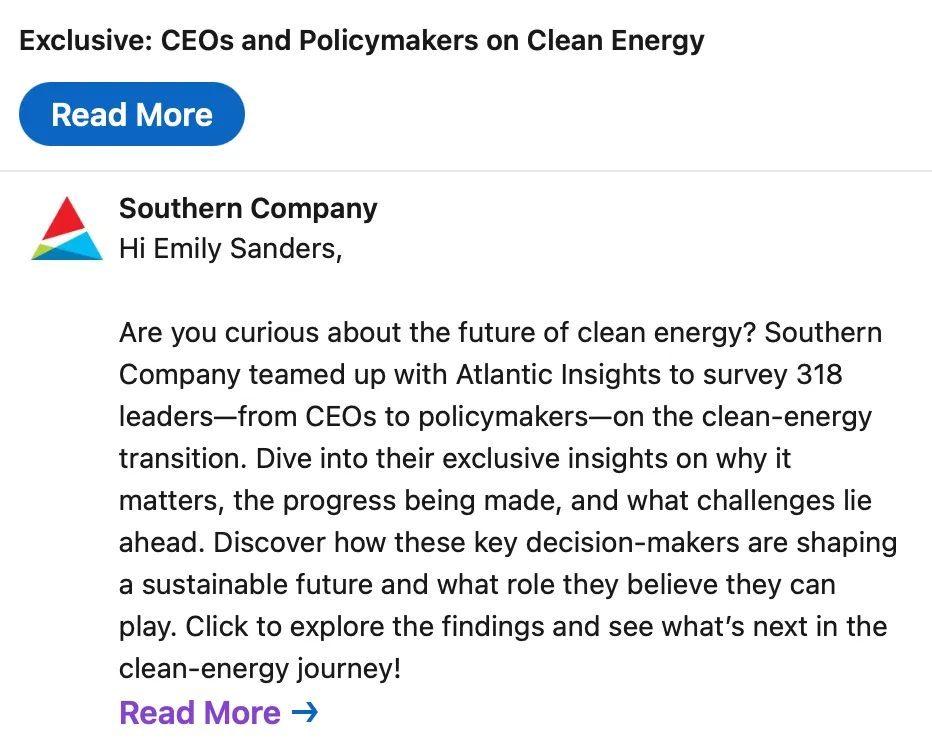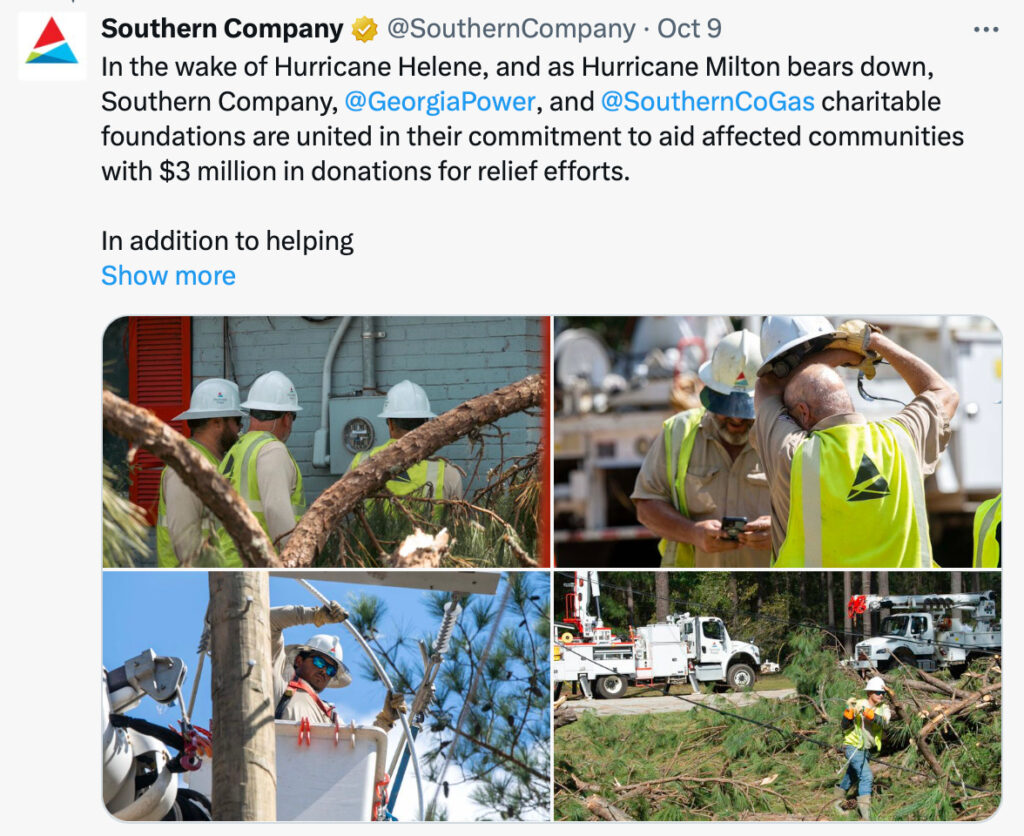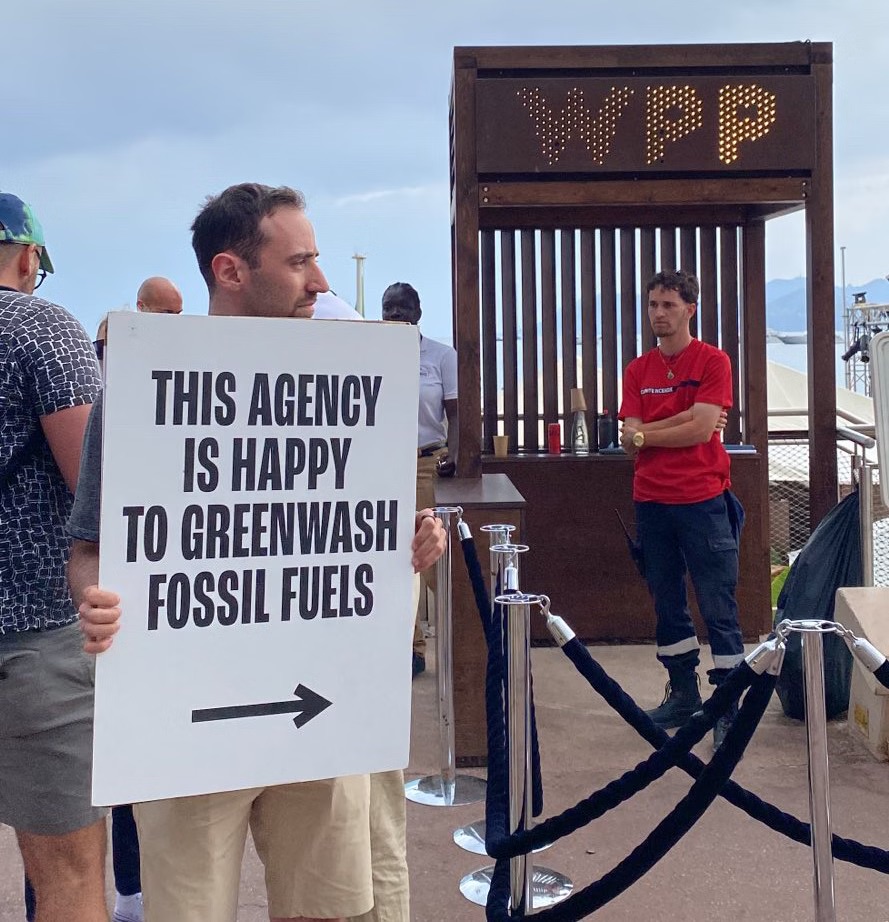As I was writing about the first local government to sue a gas utility for climate deception, I received a message in my LinkedIn inbox from another major power provider — Southern Company, a utility holding company heavily invested in gas throughout the South.

The message promised “exclusive insights” about the clean energy transition, and it took me to a page titled “Why Net Zero isn’t Zero-Sum” on the website of The Atlantic, the Pulitzer Prize-winning magazine. Southern Company partnered with Atlantic Insights, the marketing research team at The Atlantic, for a downloadable “white paper” that quotes anonymous corporate executives, board members, and public sector leaders on their views about the energy transition. The paper argues that the lack of progress in addressing climate change can be attributed to “misalignment” between the public and private sectors, who “often point fingers at each other.” It promotes collaboration between governments and companies, who can work together to develop clean energy sources.
“It’s our responsibility, as individuals and organizations, to harness our own energy and map an actionable path forward, with an awareness that pointing fingers is an inexcusable form of inaction, and that net zero is a promise we must keep for the well-being of the planet’s citizens, communities, businesses, and economies,” the paper concludes.
The message behind the sponsored content is a common refrain among fossil fuel companies: don’t blame private industry for a lack of climate progress, because we are all responsible. It does not mention the swell of lawsuits that accuse fossil fuel companies, and most recently, a utility company, of deceiving the public and policymakers and obstructing climate action for decades, and of making false promises about their role in solutions today.
Instead, the partnership combines two tactics fossil fuel companies have long used to launder their image and promote their vision for the future: sponsoring research to redirect conversations about the energy transition (i.e. who should be involved, and what counts as clean energy), and sponsoring content in mainstream media outlets to disguise their messaging as journalistic and credible.
For decades, mainstream media outlets like The Washington Post and The New York Times ran fossil fuel industry “advertorials” — ads disguised as opinion pieces — that undercut and downplayed climate science. Today, leading outlets are creating branded content for fossil fuel companies that mislead readers about the companies’ commitments to the energy transition and industry-backed “solutions.” A report from DeSmog and Drilled, which analyzed sponsored content in major outlets between 2020 and 2023, found “a media industry that repeatedly helps fossil fuel companies contradict the information climate reporters are sharing with the public.”
Southern Company’s white paper is a “native advertisement that The Atlantic’s in-house content studio has created on behalf of their client, Southern Company,” and “nothing more than a propaganda effort that The Atlantic name confers legitimacy to,” said Michelle Amazeen, an associate professor of journalism studies and advertising at Boston University who specializes in researching misinformation. “It is not independent, peer-reviewed research. It is marketing research which, fundamentally, is used to market products,” Amazeen said. The partnership “is in the best interest of Southern Company rather than the public interest.”
For its part, The Atlantic acknowledged that the collaboration with Southern Company was a marketing effort. Anna Bross, a senior vice president of communications at The Atlantic, told me that “Atlantic Insights is the marketing research division of The Atlantic. To be sure there is no confusion, Insights is part of our sales and marketing team, separate and independent from our editorial division.”
The Atlantic has partnered with Southern Company on marketing before, including through The Atlantic Ideas Festival, which is billed as “addressing the most significant issues of our time with today’s boldest thinkers as we bring The Atlantic’s journalism to life onstage.” This year, Southern Company is an underwriter of the festival; in 2022 and 2023, The Atlantic’s CEO, Nicholas Thompson, interviewed the company’s CEOs about the transition to clean energy. Those interviews were “distinct and separate from the editorial interviews at the Festival, and clearly delineated, introduced, and labeled as such,” said Bross.
Bross also pointed me to guidelines that cover the outlet’s advertising, “including very clear labeling, fonts, and branding — so as to distinguish advertising from our journalism.” But while Amazeen said guidelines are an important first step, her research shows that such distinctions aren’t often appreciated — or even noticed — by the readers that sponsored content is intended to reach. “Publishers can (and do) say whatever they want about clear labeling,” she said. “What really matters is whether audiences can make this distinction.”
(When I asked Bross if blurred lines were a concern for The Atlantic, she responded that the outlet “fundamentally rejects” that characterization due to its labeling and that its audience is “incredibly sophisticated” and able to distinguish between the two.)
Southern Company’s ‘Denial and Delay‘
Utilities like Southern Company — and the outlets that partner with them — have largely escaped criticism for greenwashing their role in the climate crisis. “What Southern Company is doing in terms of lobbying to fight this transition really deserves a lot more of a spotlight,” said Neil Sardana, an organizer at Georgia Conservation Voters.
For many advocates and researchers working in the states where it operates, Southern Company is one of the last entities you’d want to trust to deliver guidance on the clean energy transition. The company has a “long history in climate denial and delay,” said Daniel Tait, a research director at the Energy and Policy Institute, which published a report in 2022 documenting Southern Company’s early knowledge about the dangers of burning fossil fuels and decades-long disinformation campaigns to curb climate action. Tait, who is also the executive of Energy Alabama, a nonprofit that advocates for clean energy in the state, says Southern Company is still undermining the energy transition today.
They are building new gas-burning units, still rely on coal for power, and are actively blocking clean energy solutions like solar, he said.
Southern Company’s Alabama subsidiary, Alabama Power, has imposed a charge on rooftop solar panel owners, which is being challenged in court, as well as a tax on large-scale producers of solar energy. The company is also known by local advocates for its prolific dumping of toxic coal ash and for operating the most greenhouse gas-intensive power plant in the nation, located in West Jefferson, Alabama. Southern Company uses hundreds of millions in taxpayer dollars to run a carbon capture testing and research center in Wilsonville, Alabama, even after the company was investigated for fraud, sued, and forced to refund $377 million to ratepayers for its failed carbon capture project at a coal plant in Kemper County, Mississippi.
Ramsey Sprague, President of the Alabama-based Mobile Environmental Justice Action Coalition, described Alabama Power as “vampiric,” and said it suppresses renewable energy generation in the state, pledges to mitigate its pollution via “unproven” carbon capture technologies, and “fleeces its customers” for the benefit of investors on Wall Street. A 2023 study found that Alabamians have the highest electricity bills in the United States.
Jilisa Milton, a co-director at the Greater-Birmingham Alliance to Stop Pollution, found Southern Company’s promotion of public-private partnerships around the energy transition ironic. “I don’t think they’ve ever invited us to have that conversation,” she said about Alabama Power. “We’ve tried to engage executives — there’s not really a channel for that.”
Southern Company has a very different version of its role in climate change, maintaining that gas is essential for a clean energy transition. “Natural gas and the infrastructure that transports it are foundational to achieving a sustainable future where energy is clean, safe, reliable and affordable,” reads its website. (Methane, the primary component of gas, is an even more potent greenhouse gas pollutant than carbon dioxide.)
Alabama Power says it gets nearly a third of its power from clean energy. But the Sierra Club gave Southern Company an “F” grade — zero out of 100 — in a report that scores utilities on their energy transition plans.
“The reality from their operating companies in Mississippi, Alabama, and Georgia just does not match the rhetoric whatsoever,” said Sardana, who noted that Georgia Power is expanding fossil fuel generation in the state. “We see how much influence Southern Company has gained within our state and federally in terms of pushing back against climate regulations and protecting fossil fuels.”
After Hurricane Helene struck in September, thousands of Georgia residents went without power or running water for nearly three weeks. Southern Company has touted its recovery efforts in the area — but by keeping Georgia’s grid reliant on coal and gas infrastructure, Sardana said, the utility left residents more vulnerable to outages, not to mention that burning fossil fuels increases the damage caused by hurricanes like Helene.

“To me, you can’t completely divorce the issue of fueling climate change and then having to recover from the damage when climate devastation takes place,” Sardana said.
Media’s Role
Its partnership with The Atlantic isn’t the first time Southern Company has used media funding to bolster its image. Floodlight News found that Southern Company subsidiary Alabama Power finances two news outlets in the state — a digital news service founded by the utility, and a Black newspaper bought by its philanthropic foundation. According to Floodlight’s analysis, the news center “publishes overwhelmingly positive stories about the power company,” while the newspaper’s coverage of Alabama Power consists of reprinted stories from the news center and the utility’s own press releases.
Various fossil fuel and utility interests across the country are now funding struggling local news outlets to sway public opinion about their operations.
Sponsored content and advertising partnerships offer corporate interests a similar opportunity. According to Amazeen’s research, not only are readers often deceived by the advertisements news outlets create for brands, thinking they are legitimate news, but news outlets are also less likely to report on companies that paid them to create branded content.
In response to my questions about their partnership with Southern Company, The Atlantic’s Bross said their editorial team was fully independent from sponsored content — a standard practice in newsrooms — and that “advertising relationships do not affect how we cover any company.” But when I asked whether The Atlantic has ever reported on Southern Company outside of those partnerships, Bross did not provide any examples.
“It’s difficult to hold powerful interests to account if news organizations won’t report on them out of fear of losing an advertiser,” Amazeen told me. “At a time when facts are under siege, disinformation is ascendent, and when the public should be turning to traditional news sources for accurate, vetted information, I am concerned that news publishers are adding to the confusion and eroding their own legitimacy by blurring commercial and journalistic content.”
Subscribe to our newsletter
Stay up to date with DeSmog news and alerts







